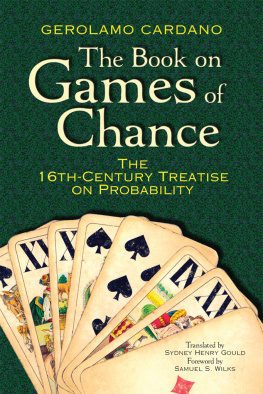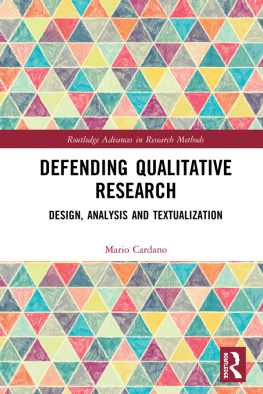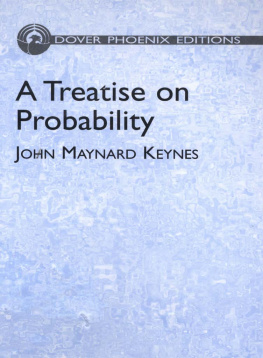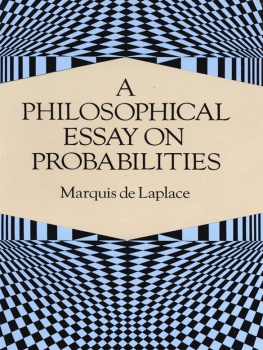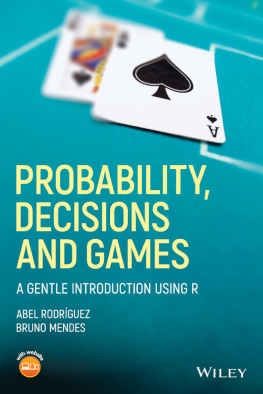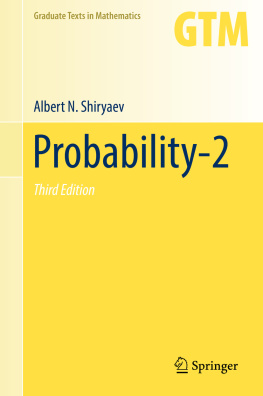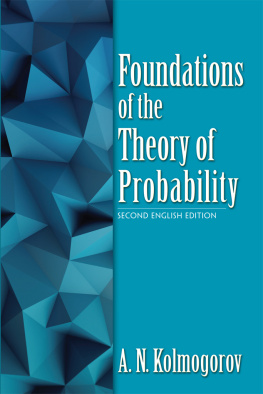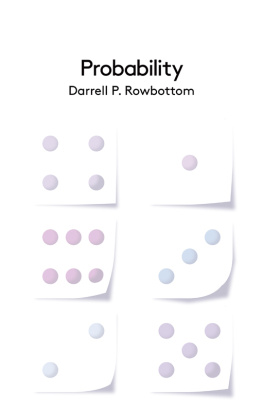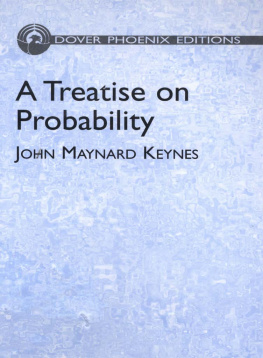The Book on
Games of Chance
THE 16TH-CENTURY TREATISE ON PROBABILITY
GEROLAMO CARDANO
TRANSLATED BY
SYDNEY HENRY GOULD
FOREWORD BY
SAMUEL S. WILKS
DOVER PUBLICATIONS, INC.
MINEOLA, NEW YORK
Copyright
Copyright 1961 by Holt, Rinehart and Winston, Inc.
Foreword Copyright 1961, 1989 by Samuel S. Wilks
All rights reserved.
Bibliographical Note
This Dover edition, first published in 2015, is an unabridged republication of the work originally published by Holt, Rinehart and Winston, New York, in 1961. This edition is published by special arrangement with Cengage Learning, Inc., Belmont, California.
Library of Congress Cataloging-in-Publication Data
Cardano, Girolamo, 15011576.
[Liber de ludo aleae. English]
The book on games of chance : the 16th-century treatise on probability / Gerolamo Cardano ; translated by Sydney Henry Gould ; foreword by Samuel S. Wilks. Dover edition.
pages cm
Originally published: New York : Holt, Rinehart and Winston, 1961.
eISBN-13: 978-0-486-80898-7
1. GamblingEarly works to 1800. 2. Games of chance (Mathematics) 3. Probabilities. I. Gould, Sydney H. (Sydney Henry), 1909 translator. II. Title.
GV1301.C313 2015
306.482dc23
2015020934
Manufactured in the United States by RR Donnelley
79793701 2015
www.doverpublications.com
Foreword
Dr. Sydney H. Gould, who has provided this English translation of Cardanos Liber de ludo aleae (The Book on Games of Chance), and Professor Oystein Ore, who first published the translation together with an excellent commentary on it at the end of his book Cardano, the Gambling Scholar (Princeton University Press, 1953), have made valuable contributions to the history of probability by bringing to light this remarkable four-hundred-year-old article. The present publication of the translation itself as a separate booklet makes more widely available a document in the earliest history of probability which merits greater recognition than it has received up to now.
Historians of mathematics such as Libri, Gauraud, Todhunter, Cantor, and Bell have all identified the beginning of the mathematical theory of probability with the Pascal-Fermat correspondence of 1654 concerning the Chevalier de Mrs Problem of Points. This problem can be stated as follows: If the first of two gamblers to receive n points in a game wins, how should the stakes be divided if the gamblers stop playing when one player has x points and the other y? They have all dismissed Cardanos Ludo aleae, a much earlier document, with hardly more than a shrug, describing it merely as a gamblers manual having little or no relevance even for the earliest chapter in the history of the theory of probability.
Cardano wrote his Ludo aleae around 1520 while he was student rector at the University of Padua. This makes Cardanos book outdate the Pascal-Fermat correspondence by a little more than one hundred and thirty years. The manuscript remained out of sight until its publication in Latin in 1663, long after Cardanos death in 1576 at the age of seventy-five. It had no direct influence on the development of the theory of probability, since the theory of probability at the time of its publication had reached a stage of sophistication exceeding that of Cardanos work. However, from the point of view of the history of scientific thought, credit must be given to Cardano for a formulation of important ideas concerning probability well over a century before the Pascal-Fermat correspondence.
Cardano was an able man with an extremely wide range of interests. He was a physician, a teacher of mathematics, and an author of books on subjects ranging from medicine and occult practices, to mathematics, astronomy, philosophy, and religion. He was a man of many faults who lived a stormy life. He thrived on controversy. His most notorious controversy in mathematics was with Tartaglia, who accused Cardano of publishing his method of solving the general cubic equation.
Cardano was an inveterate gambler. As historians of mathematics have pointed out, his Ludo aleae is, in essence, a gamblers manual. The odds worked out by Cardano for various events resulting from throwing dice seemed to be of secondary interest to him. He was not overly meticulous in his writing. He made errors in determining odds for certain events, some of which were corrected in later sections of the book, but left standing in the earlier sections! This carelessness is perhaps one of the main reasons why the historians have dismissed the Ludo aleae as being of little significance for the history of science.
It is evident from reading Cardanos Ludo aleae that he must be credited with an amazing early-sixteenth-century ability to set up what we now call sample spaces associated with the throwing of two dice, three dice, and even four astragals, or knucklebones, and to determine probabilities for the occurrence of various events in these spaces. No recorded evidence seems to exist that anyone before Cardano succeeded in putting odds for the occurrence of chance events into mathematical terms. Cardano determined the probabilities of the various ordinary sums of points (sors), and points as counted in backgammon (fritillus) obtainable by throwing two or three dice. He worked out the probabilities of the five types of events obtainable by throwing four astragals, a game introduced by the ancient Greeks. He dealt with probabilities of some of the simple draws in card games, particularly as practiced in the medieval poker, called primero. He succeeded in determining the probability that a given event with dice occurs in two, three, or any given successive number of throws. Cardano had a good sense of the law of large numbers within the limitations of early-sixteenth-century mathematical science.
The theory of probability, one of the most important branches of modern mathematical science, with applications in almost every field of science and technology, had its origin in gambling, whether reckoned from the Pascal-Fermat correspondence in 1654 or from Cardanos Ludo aleae more than a century earlier. But the reader interested in the earliest known beginnings of the theory of probability will find them in this booklet. He will gain further insight on the role of Cardano in the history of probability by reading Professor Ores commentary on the Ludo aleae in his book on Cardano, The Gambling Scholar. References to Ore in the footnotes (which are by Professor Ore) are to that book.
SAMUEL S. WILKS
Princeton, New Jersey
July, 1960
Contents
1. On Kinds of Games
from which we (though not the whole world) are composed. Moreover, it has marvelous varieties.
The same name: alea.
Aristotles four elements: earth, fire, air, water. Cardano him self did not usually consider fire as an element.
2. On Conditions of Play
ATTENTION must be given to the state of the player and of his opponent, and also to the conditions under which the game is played, such as the amount of money wagered, the place, and the occasion; for the latter is of such importance that permission has been given for gambling at funeral banquets. Thus there is a heading in the law books, Funeral expenses and games of chance. At other times it has been condemned by the law, as in the Titian and Cornelian Laws.
But in times of great anxiety and grief, it is considered to be not only allowable, but even beneficial. Also, it is permitted to men in prison, to those condemned to death, and to the sick, and therefore the law also permits it in times of grief. For certainly, if any occasion will justify it, none is so worthy of excuse as this one. In my own case, when it seemed to me after a long illness that death was close at hand, I found no little solace in playing constantly at dice.

